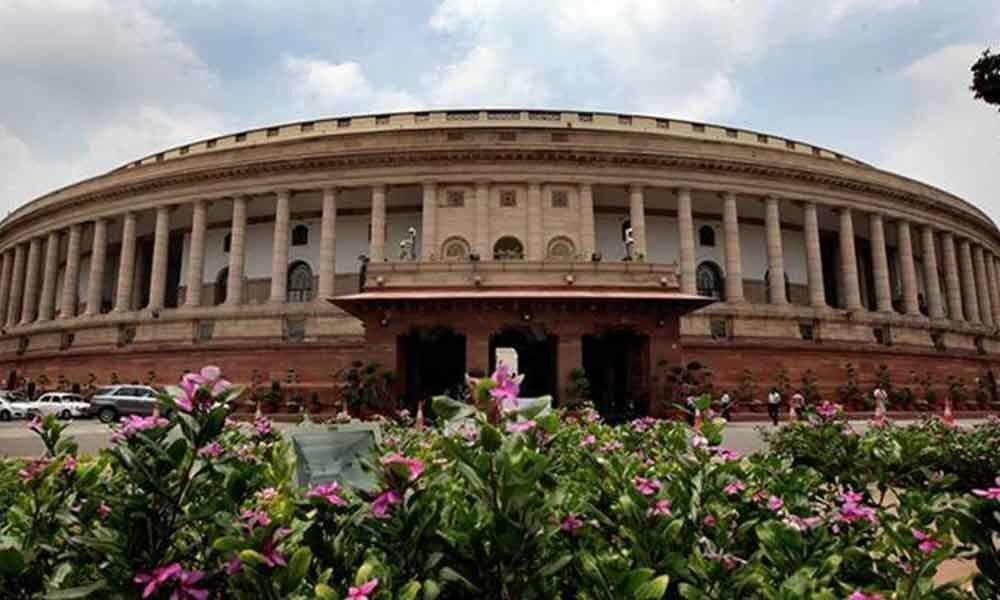Live
- YSRCP Announces Boycott of PAC Elections
- Badshah and Davido tease epic collaboration
- Skills for the future: Adapting education to meet employability demands
- Breaking a Century-Old Rule: How Garg’s Team Challenges Bredt’s Rule in Organic Chemistry
- Neha Bhasin rocks with her debut rap song
- Moong Dal Ki Kachori: A delightful crispy treat
- Vivo Warns the Risks of UV-Cured Screen Protectors; Check Vivo's Recommendations
- BJP, Congress turncoats in AAP's first list
- Adani tried to enter Delhi's power sector: AAP's Sanjay
- International Kabaddi Federation sanctions World Super Kabaddi League 2025
Just In
Centre's haste in passing Bills rings alarm bells


The hurry with which the ruling party is passing Bills in the lower and the upper Houses of Parliament is quite disturbing.
The hurry with which the ruling party is passing Bills in the lower and the upper Houses of Parliament is quite disturbing. Parliament is supposed to scrutinise the Bills.
That is its primary duty. To be passed or not, comes much later. Parliamentary procedures are listed in detail. Legislative proposals are brought before either house of Parliament of India in the form of a Bill.
A Bill is the draft of a legislative proposal, which, when passed by both houses of Parliament and assented to by the President, becomes an Act of Parliament.
As soon as the bill has been framed, it has to be published in the newspapers and the general public is asked to comment in a democratic manner.
The Bill may then be amended to incorporate the public opinion in a constructive manner and then may be introduced in Parliament by Ministers or private members.
The former is called government Bills and the latter, private members' Bills. Bills may also be classified as public Bills and private Bills.
A public Bill is one referring to a matter applying to the public in general, whereas a private Bill relates to a particular person or corporation or institution.
The Orphanages and Charitable Homes Bill or the Muslim Waqf Bills are examples of private Bills. A Bill introduced in the Lok Sabha pending for its approval, lapses when the Lok Sabha is dissolved. A Bill is the draft of a legislative proposal.
It has to pass through various stages before it becomes an Act of Parliament. There are three stages through which a Bill has to pass in one House of Parliament. The procedure is similar for the Legislative Assemblies of States. The legislative process begins with the introduction of a Bill in either House of Parliament, i.e. the Lok Sabha or the Rajya Sabha.
When the Bill is introduced, it is time for the First Reading. After a Bill has been introduced, it is published in the Gazette of India. Even before introduction, a Bill might, with the permission of the Speaker, be published in the Gazette. In such cases, leave to introduce the Bill in the House is not asked for and the Bill is straight away introduced.
Thus, it is not just objectionable but also abominable that the ruling party is in a hurry in pushing its agenda. The RTI Amendment Bill passed by both the Houses the other day tolled the death knell of the very Act itself.
Similarly, the Triple Talaq Bill that needed a greater debate lost its significance due to the hurried pace in which it was managed to put through the Rajya Sabha. It is not about whether a Bill is right or wrong, but it needs a careful consideration of every aspect that it spells out.
Our Parliament usually scrutinises at least 70 per cent of the Bills. But in this session so far, hardly five per cent have been scrutinised. There is a second stage of discussion and a third stage too. Why are all these being bulldozed and in whose interest?

© 2024 Hyderabad Media House Limited/The Hans India. All rights reserved. Powered by hocalwire.com






